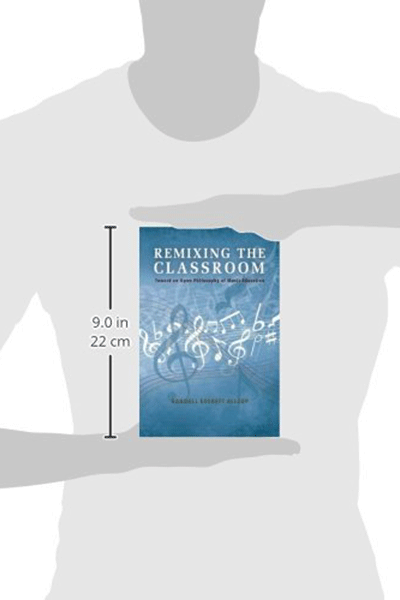Remixing The Classroom by Randall Everett Allsup
In a delightfully self-conscious philosophical “mashup,” Randall Everett Allsup provides alternatives for the traditional master-apprentice teaching model that has characterized music education. By providing examples across the arts and humanities, Randall promotes a vision of education that is open, changing, and adventurous at heart. He contends that the imperative of growth at the core of all teaching and learning relationships is made richer, the less certain, when it is fused with a students self-initiated quest. In this way, the formal study of music turns from an education in teacher-directed craft and moves into much larger and more complicated fields of exploration. Through vivid stories and evocative prose, Randall advocates for an open, quest-driven teaching model that has repercussions for music education and the humanities more generally.
“ . . . Endless forms most beautiful and wonderful, wondrous and unholy, an entangled bank, a New England swamp, the hijacking of a style, recovering the old, covering the briefly new, the flipping, dipping, and serving up of a mash-up – these endless forms most beautiful and most wonderful have been, and are being, evolved (p. 35).”
“ . . . Like my students, I am much more than you can see, and more than I can tell you. I am a text, like my fellow students, like our classroom community. We are the Chimera, a monstrous and beautiful assemblage, moving, like the music we make, in between, within, and outside labels. In this sense, I see my students as unfinished and ongoing, as well. I have given up asking them very much about themselves at the beginning of the year. If there is something I need to know, I will ask. If there is something they wish to share, they will do so. I want to look beyond what I can see. I want to hear new frequencies. I trust in ongoing revelation. This is why questions are so important. They create new beginnings, and new beginnings create new selves (p. 105).”
“ . . . To teach in a way that renews openness, from encounter to encounter, from classroom to classroom, is to forgo conclusions. Its ineffable promise is the pleasure and peril of renewal (141).”







